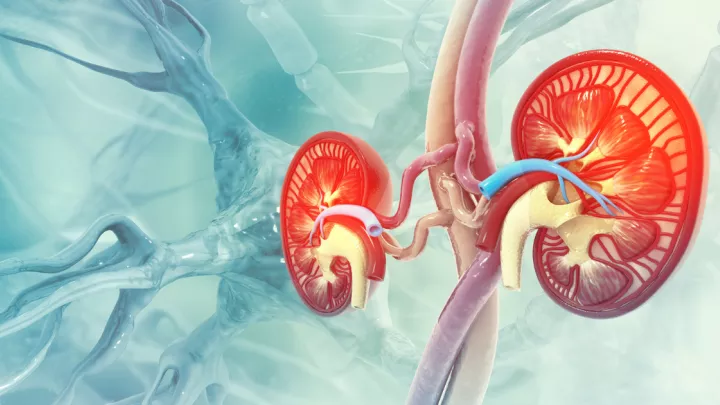How does diabetes affect the kidneys?

According to the Centers for Disease Control and Prevention, approximately 1 in 3 adults with diabetes has kidney disease. Chronic kidney disease develops gradually, typically with no symptoms.
Diabetes is the leading cause of kidney disease. If you have diabetes, it’s essential to stay current with regular blood and urine testing to help prevent and identify chronic kidney disease (CKD), also known as diabetic nephropathy, early while treatment is most effective.
How does diabetes affect the kidneys?
The kidneys' main job is to filter waste and surplus water out of the blood, forming urine. In addition, the kidneys help control blood pressure and produce hormones. Over time, kidney disease gradually damages the kidney’s ability to filter and do its job correctly.
Your kidneys, which house microscopic filters known as nephrons, are vulnerable to high blood sugar (glucose). Over time, this can lead to blood vessel and nephron damage. The blood vessels can become clogged and narrowed, impairing the kidneys' function. Hyperfiltration, a condition that forces the kidneys to work harder than usual, can eventually cause the nephrons to stop working altogether.
“When these blood vessels become damaged, the kidney begins to leak proteins called albumin,” says nephrologist Kathleen Borghoff, MD. “The more protein leakage, the worse the kidney disease progresses. Excessive glucose also causes toxins to build up in the kidneys, which causes inflammation and cell stress. This cell stress and damage can lead to kidney cell death.”
Diabetes can also harm the kidneys by damaging the nerves in your body that send signals to your organs, and high sugar levels can cause rapid growth of bacteria in urine.
People with Type 1 and Type 2 diabetes are both at risk of diabetic kidney disease
The longer you have either type of diabetes, the chance of kidney damage increases. Left untreated, diabetic kidney disease gets worse over time. This is especially true if your blood glucose levels or blood pressure are uncontrolled.
“Kidney disease is sneaky because often there are no symptoms until the very late stages,” adds Dr. Borghoff. “Patients will often be surprised they have kidney damage because they feel fine. This is why keeping up with doctor appointments and labs is so important. Knowing that a patient has kidney disease helps us to take steps to slow its progression.”
Risk factors for diabetic kidney disease include:
- Uncontrolled high blood sugar (hyperglycemia).
- Uncontrolled high blood pressure (hypertension).
- High blood cholesterol.
- Family history of diabetes and kidney disease.
- Obesity.
- Smoking.
How is kidney disease diagnosed?
Kidney disease is diagnosed via a blood test to measure the amount of creatinine in your blood, which is used to estimate your glomerular filtration rate, or GFR. Your GFR shows whether your kidneys are filtering at normal levels. A urine test is also taken to see if the protein albumin is present in your urine.
I have diabetes. How can I protect my kidneys?
There are a variety of things you can do to keep your kidneys healthy.
- Reach and control your glucose level goals.
- Control your blood pressure and keep your cholesterol levels within target range.
- Keep your regular doctor appointments and testing schedule.
- Take all your medicines as prescribed, including ACE inhibitors and ARBs, which may protect your kidneys or slow disease progression.
- Maintain a healthy lifestyle. This includes eating a nutritious diet, exercising, getting enough sleep, reducing stress and maintaining a healthy weight.
- Stop (or don’t start) smoking or using tobacco products, and limit your alcohol intake.
Why talk to my doctor about kidney disease?
Serious complications can result from untreated diabetic kidney disease. Kidney disease is not reversible and can eventually lead to life-threatening kidney failure and the need for a kidney transplant.
Early treatment offers the best way to help slow the progression to prevent further damage. Talk to your doctor about how to prevent or manage diabetes to avoid kidney disease altogether.







